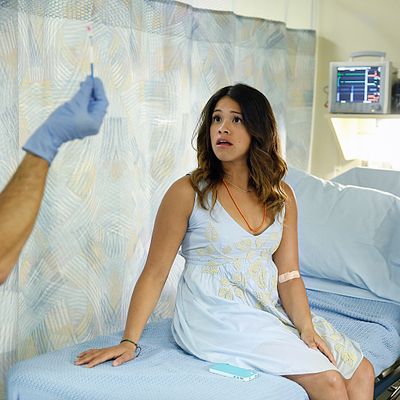
Jane the Virgin has the seasonÔÇÖs most outlandish premise: Our heroine Jane (Gina Rodriguez) is accidentally inseminated after a frazzled gynecologist mixes up which patient is in which room, and now here she is, a pregnant virgin. As if that werenÔÇÖt bonkers enough, her fetusÔÇÖs biological father is Rafael, a hotshot hotelier whom Jane had crush on a few years back. Rafael is married to a terrible woman; Jane is about to be engaged to a seemingly wonderful dude; oh, and JaneÔÇÖs never-in-the-picture-before dad has resurfaced, and heÔÇÖs a big soap star, and he tells her mom that he wants to meet her. ItÔÇÖs a lot! Plus a grandma! And yet Jane doesnÔÇÖt feel like too much. The emotions track, the characters make sense, thereÔÇÖs a clearly established world and tone and structure. Jane knows itself right off the bat.
A huge part of the showÔÇÖs success comes from RodriguezÔÇÖs performance. Because thereÔÇÖs so much heaped on the Jane character ÔÇö┬áand so much of if can seem pretty horrifying without the buffer of the showÔÇÖs telenovela style ÔÇö┬áitÔÇÖs essential that she not seem like a victim, like someone to pity. Rodriguez instead is all warmth and confidence, and her Jane moves through the world with the sense of self you only get by being raised by people who really loved and treasured you. (True on TV, true in life.) Jane the Virgin is a shining example of how much a show can get away with as long as it takes its characters seriously. The show buys into the idea of Jane, of JaneÔÇÖs concerns, JaneÔÇÖs strengths, JaneÔÇÖs sensibilities. This is the world Jane lives in, and this is the way she feels about it.┬áIt sounds so easy! But you donÔÇÖt need to look at too many other shows to realize this isnÔÇÖt easy, or at least isnÔÇÖt common.
Jane is based on the Venezuelan telenovela Juana la Virgen, and it feels at times a little like Pushing Daisies: ThereÔÇÖs a whimsical narrator; things feel very fated; we know exactly whom to root for and how much. The show credibly addresses JaneÔÇÖs option to have an abortion and doesnÔÇÖt rely only on religiosity to explain why she decides against it. Despite the showÔÇÖs melodrama, everyone has a backstory, too; the inflated emotions of the show could just kind of float away were they not anchored by authentic, sometimes painful, true ideas. JaneÔÇÖs grandma isnÔÇÖt just some Bible-thumper ÔÇö sheÔÇÖs speaking from experience when she talks about how hard it is to raise children. JaneÔÇÖs mother didnÔÇÖt stop having romantic fantasies and personal dreams when she became a mom; she just had to funnel that energy in a different direction. Even in soap-opera crazy-bananas pregnant-virgin world, characters can and ought to contain multitudes.
I was totally charmed by Jane the Virgin. This is my dream for all shows: that they have a clear idea; a way in which that idea is uniquely theirs; a cast that can give a rich, full life to those concepts; and the savviness to use both comedic and dramatic elements to explore and enrich those characters and the articulated world they inhabit. We see this in harsh, gritty dramas and in bubbly, joyous comedies, and here we see it in, of all places, a CW telenovela.

